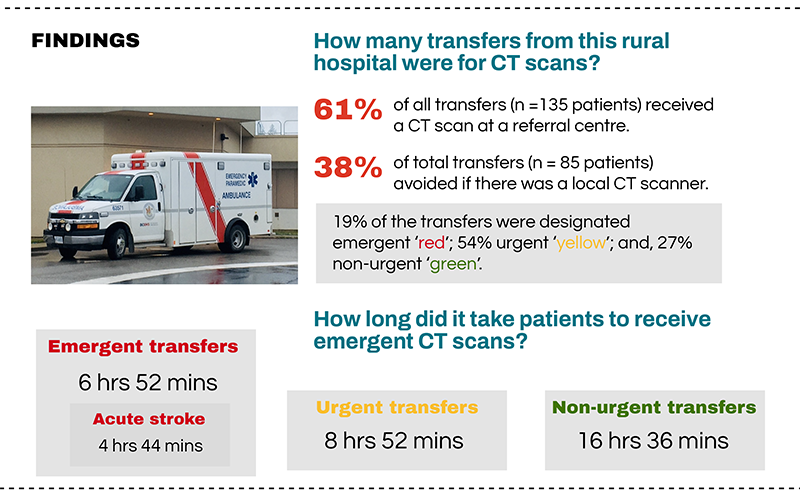Timely access to a CT scan is critical to diagnose and triage patients with life-threatening illnesses. In BC, only 3% of rural hospitals have access to a local CT scanner, and patients in these communities must often be transferred hundreds of kilometres away for emergent imaging.
A recently published study, led by member Adam Watchorn, investigates how many transfers from Golden and District Hospital were for CT scans over a 1-year time period, and describes the time delays to emergent CT imaging.


This is the first study to track time intervals and characterize inter-facility transfers from a rural to urban hospital in BC.
A large proportion of transfers received CT scans and the delays for emergent CT scans were long. These delays may cause negative outcomes. In 1997 the Canadian Association of Emergency Physicians recommended that CT scanners should be more available in rural Canada.
Unfortunately, almost 25 years later we still see a rural-urban disparity in access to CT scans. Future research addressing inter-facility transfers for CT scans and patient outcomes would be helpful for further health policy and services planning.
View the full study in CJEM: Evaluating delays for emergent CT scans from a rural British Columbia hospital.

COMMENTS (1)
Congratulations to you and your team for looking at this incredibly important issue. Fantastic work! CT is replacing plain radiography for a majority of imaging studies. With the cost of CT coming down substantially, the health economic metrics are changing year by year. This work will inform the rest of rural BC in any consideration for CT at their site. Within Northern Health, the communities of Fort Nelson and Haida Gwaii are doing just that. Thank you for this study.
Add public comment…


Congratulations to you and your team for looking at this incredibly important issue. Fantastic work! CT is replacing plain radiography for a majority of imaging studies. With the cost of CT coming down substantially, the health economic metrics are changing year by year.
This work will inform the rest of rural BC in any consideration for CT at their site. Within Northern Health, the communities of Fort Nelson and Haida Gwaii are doing just that. Thank you for this study.